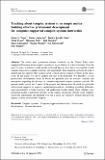| dc.contributor.author | Anderson, Emma | |
| dc.contributor.author | Koehler-Yom, Jessica | |
| dc.contributor.author | Evans, Chad | |
| dc.contributor.author | Park, Miyoung | |
| dc.contributor.author | Yoon, Susan A. | |
| dc.contributor.author | Sheldon, Joshua | |
| dc.contributor.author | Schoenfeld, Ilana | |
| dc.contributor.author | Wendel, Daniel J | |
| dc.contributor.author | Scheintaub, Hal | |
| dc.contributor.author | Klopfer, Eric | |
| dc.date.accessioned | 2017-02-02T21:17:34Z | |
| dc.date.available | 2017-07-02T05:00:03Z | |
| dc.date.issued | 2016-09 | |
| dc.date.submitted | 2015-04 | |
| dc.identifier.issn | 0020-4277 | |
| dc.identifier.issn | 1573-1952 | |
| dc.identifier.uri | http://hdl.handle.net/1721.1/106838 | |
| dc.description.abstract | The recent next generation science standards in the United States have emphasized learning about complex systems as a core feature of science learning. Over the past 15 years, a number of educational tools and theories have been investigated to help students learn about complex systems; but surprisingly, little research has been devoted to identifying the supports that teachers need to teach about complex systems in the classroom. In this paper, we aim to address this gap in the literature. We describe a 2-year professional development study in which we gathered data on teachers’ abilities and perceptions regarding the delivery of computer-supported complex systems curricula. We present results across the 2 years of the project and demonstrate the need for particular instructional supports to improve implementation efforts, including providing differentiated opportunities to build expertise and addressing teacher beliefs about whether computational-model construction belongs in the science classroom. Results from students’ classroom experiences and learning over the 2 years are offered to further illustrate the impact of these instructional supports. | en_US |
| dc.description.sponsorship | National Science Foundation (U.S.). Discovery Research K– 12 (Grant 1019228) | en_US |
| dc.publisher | Springer Netherlands | en_US |
| dc.relation.isversionof | http://dx.doi.org/10.1007/s11251-016-9388-7 | en_US |
| dc.rights | Creative Commons Attribution-Noncommercial-Share Alike | en_US |
| dc.rights.uri | http://creativecommons.org/licenses/by-nc-sa/4.0/ | en_US |
| dc.source | Springer Netherlands | en_US |
| dc.title | Teaching about complex systems is no simple matter: building effective professional development for computer-supported complex systems instruction | en_US |
| dc.type | Article | en_US |
| dc.identifier.citation | Yoon, Susan A. et al. “Teaching about Complex Systems Is No Simple Matter: Building Effective Professional Development for Computer-Supported Complex Systems Instruction.” Instructional Science (2016): n. pag. | en_US |
| dc.contributor.department | Massachusetts Institute of Technology. Institute for Data, Systems, and Society | en_US |
| dc.contributor.department | Massachusetts Institute of Technology. Computer Science and Artificial Intelligence Laboratory | en_US |
| dc.contributor.department | Massachusetts Institute of Technology. Department of Urban Studies and Planning | en_US |
| dc.contributor.mitauthor | Sheldon, Joshua | |
| dc.contributor.mitauthor | Schoenfeld, Ilana | |
| dc.contributor.mitauthor | Wendel, Daniel J | |
| dc.contributor.mitauthor | Scheintaub, Hal | |
| dc.contributor.mitauthor | Klopfer, Eric | |
| dc.relation.journal | Instructional Science | en_US |
| dc.eprint.version | Author's final manuscript | en_US |
| dc.type.uri | http://purl.org/eprint/type/JournalArticle | en_US |
| eprint.status | http://purl.org/eprint/status/PeerReviewed | en_US |
| dc.date.updated | 2017-02-02T15:19:56Z | |
| dc.language.rfc3066 | en | |
| dc.rights.holder | Springer Science+Business Media Dordrecht | |
| dspace.orderedauthors | Yoon, Susan A.; Anderson, Emma; Koehler-Yom, Jessica; Evans, Chad; Park, Miyoung; Sheldon, Josh; Schoenfeld, Ilana; Wendel, Daniel; Scheintaub, Hal; Klopfer, Eric | en_US |
| dspace.embargo.terms | N | en |
| mit.license | OPEN_ACCESS_POLICY | en_US |
| mit.metadata.status | Complete | |
